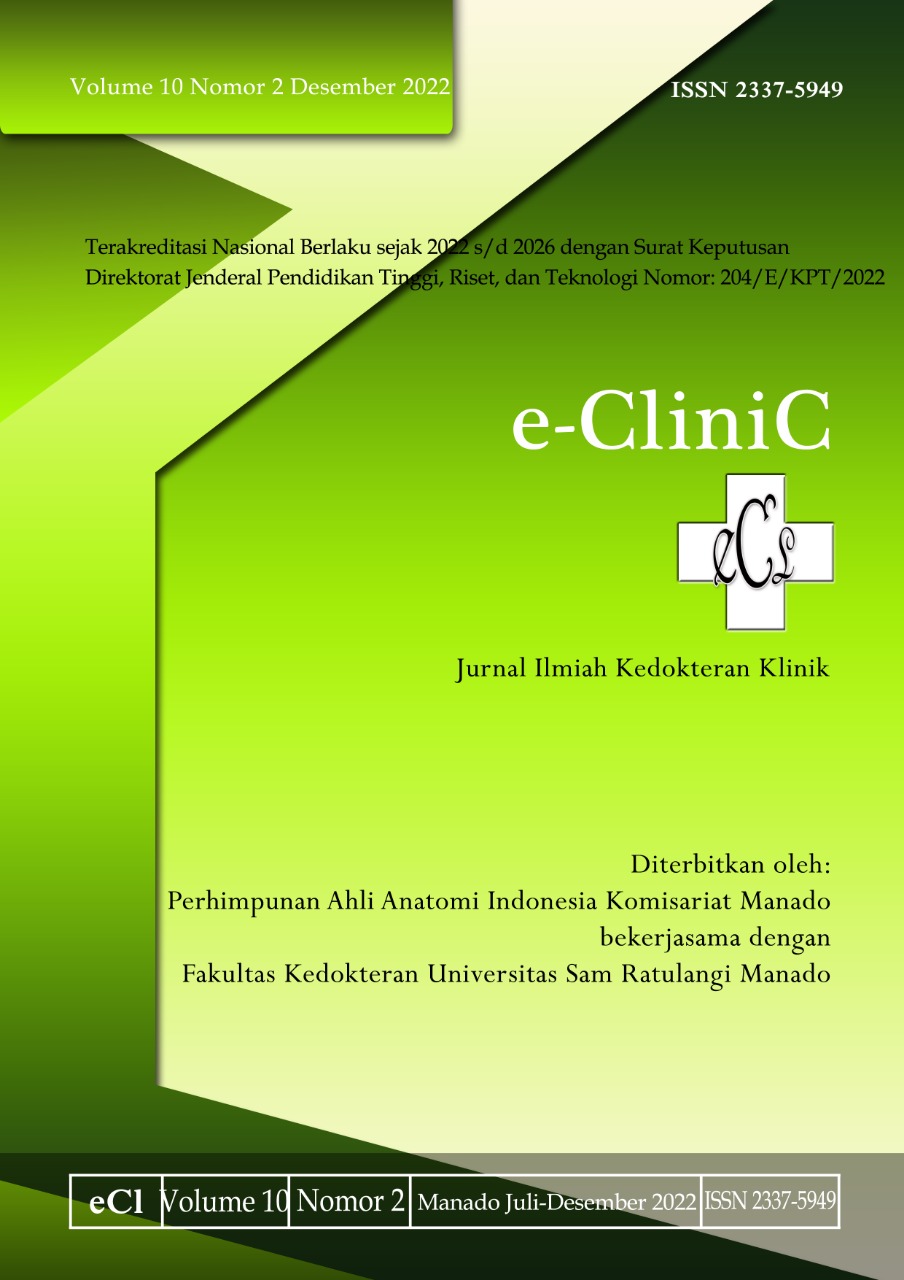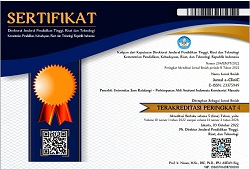Effect of Progressive Muscle Relaxation on Anxiety Level of Medical Faculty Students in Indonesia
DOI:
https://doi.org/10.35790/ecl.v10i2.39185Abstract
Abstract: Developments in various fields at this time provide a lot of pressure that causes anxiety and tension. Anxiety and depression are inhibiting factors for student academic achievement and must be overcome. Each individual responds differently to stressors and requires a different management approach. Many therapies are used to control anxiety, one of them is progressive muscle relaxation. The tension or anxiety felt can be lost or reduced when the position of the tense muscle is known and progressive muscle relaxation therapy is carried out. This study aimed to determine the effect of progressive muscle relaxation on the anxiety level of students of the Faculty of Medicine, Universitas Tarumanagara. This was an analytical study with a pretest-posttest control group design. Subjects were 80 students obtained by using the non-probability sampling technique and divided into control and experimental groups. Anxiety levels were measured using the Hamilton Rating Scale for Anxiety (HRS-A) questionnaire. The data obtained were analyzed using paired t-test. The results showed a significant change in the level of anxiety in the experimental group before being given progressive muscle relaxation with a mean of 34.43 (severe anxiety) then decreased to 15.55 (mild anxiety) right after being given progressive muscle relaxation (p<0.0001). In conclusion, progressive muscle relaxation can be applied to reduce anxiety levels.
Keywords: progressive muscle relaxation; anxiety level; medical students
Â
Abstrak: Perkembangan di berbagai bidang masa kini memberikan banyak tekanan yang mengakibatkan kecemasan serta ketegangan. Kecemasan dan depresi menjadi salah satu faktor penghambat prestasi akademik mahasiswa yang harus segera diatasi. Setiap individu memberikan tanggapan berbeda terhadap stresor sehingga membutuhkan pendekatan tatalaksana yang berbeda pula. Telah banyak terapi yang digunakan untuk mengendalikan kecemasan, salah satunya relaksasi otot progresif. Ketegangan atau kecemasan yang dirasakan dapat hilang atau berkurang ketika posisi otot yang mengalami ketegangan diketahui dan dilakukan terapi relaksasi otot progresif. Penelitian ini bertujuan untuk mengetahui pengaruh relaksasi otot progresif terhadap tingkat kecemasan mahasiswa Fakultas Kedokteran Universitas Tarumanagara. Jenis penelitian ialah analitik dengan desain pretest-posttest control group. Subyek penelitian sebanyak 80 mahasiswa diambil menggunakan teknik non-probability sampling dan dibagi menjadi kelompok kontrol dan perlakuan. Tingkat kecemasan diukur menggunakan kuesioner Hamilton Rating Scale for Anxiety (HRS-A). Data perolehan dianalisis menggunakan t-test paired. Hasil penelitian menunjukkan perubahan bermakna tingkat kecemasan pada kelompok perlakuan sebelum diberikan relaksasi otot progresif dengan rerata 34,43 (kecemasan berat) kemudian menurun menjadi 15,55 (kecemasan ringan) tepat setelah diberikan relaksasi otot progresif (p<0,0001). Simpulan penelitian ini ialah relaksasi otot progresif dapat diaplikasikan untuk menurunkan tingkat kecemasan.
Kata kunci: relaksasi otot progresif; tingkat kecemasan; mahasiswa kedokteran
Downloads
Additional Files
Published
How to Cite
Issue
Section
License
COPYRIGHT
Authors who publish with this journal agree to the following terms:
Authors hold their copyright and grant this journal the privilege of first publication, with the work simultaneously licensed under a Creative Commons Attribution License that permits others to impart the work with an acknowledgment of the work's origin and initial publication by this journal.
Authors can enter into separate or additional contractual arrangements for the non-exclusive distribution of the journal's published version of the work (for example, post it to an institutional repository or publish it in a book), with an acknowledgment of its underlying publication in this journal.
Authors are permitted and encouraged to post their work online (for example, in institutional repositories or on their website) as it can lead to productive exchanges, as well as earlier and greater citation of the published work (See The Effect of Open Access).







